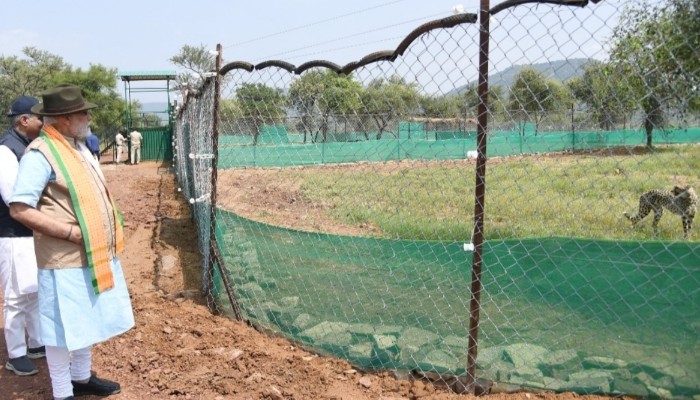This marked the reintroduction of the Cheetah in India, 70 years after it was declared extinct from the country
Wild Cheetahs brought from Namibia were released by Prime Minister Narendra Modi at two points in Kuno National Park, Madhya Pradesh on Saturday.
This marked the reintroduction of the Cheetah in India, 70 years after it was declared extinct from the country in 1952.
The eight Cheetahs - five female and three male - were brought from Namibia for being introduced in India under Project Cheetah, which was described as the world's first inter-continental large wild carnivore translocation project by the Prime Minister's Office (PMO).
According to the government, the re-introduction of cheetahs will help conserve biodiversity and enhance ecosystem services like water security, carbon sequestration and soil moisture conservation, benefiting society at large.
"This effort, in line with the Prime Minister’s commitment to environmental protection and wildlife conservation, will also lead to enhanced livelihood opportunities for the local community through eco-development and ecotourism activities," the PMO said.
Addressing the nation on the occasion, Prime Minister Modi said, “I am sure, these cheetahs will not only make us aware of our responsibilities towards nature but will also make us aware of our human values and traditions”.
The Prime Minister remarked that even though cheetahs had become extinct from India in 1952, no meaningful effort was made to rehabilitate them for the past seven decades.
Referring to the years of hard work that went behind making this rehabilitation successful, Prime Minister Modi said that a detailed Cheetah Action Plan was prepared while scientists conducted extensive research, working closely with South African and Namibian experts. He added that scientific surveys were conducted across the country to locate the most suitable area for cheetahs, and then Kuno National Park was chosen for this auspicious start. “Today, our hard work is in front of us as a result”, he remarked.
With the introduction of Cheetahs in Kuno National Park, the grassland eco-system will be restored and it will also lead to an increase in biodiversity, Prime Minister Modi said. He highlighted that employment opportunities will increase as a result of the growing eco-tourism in the area thereby opening up new possibilities for development.
"Since the formation of our government in 2014, about 250 new protected areas have been added in the country," the Prime Minister noted. There has also been a big increase in the number of Asiatic lions here and Gujarat has emerged as a dominating sphere of Asiatic lions in the country, he added.
The Prime Minister also pointed out that India had achieved the target of doubling the number of tigers ahead of time. He recalled the time when the existence of one-horned rhinoceros was in danger in Assam and said that their number had also gone up now.
The number of elephants has also increased to more than 30,000 in the last few years, Prime Minister Modi stated.
“Today 75 wetlands in the country have been declared as Ramsar sites, of which 26 sites have been added in the last 4 years”, the Prime Minister remarked, adding that “the effect of these efforts of the country will be visible for centuries to come, and will pave new paths for progress".
 Contact Us
Contact Us  Subscribe Us
Subscribe Us









 Contact Us
Contact Us
 Subscribe
Subscribe
 News Letter
News Letter

